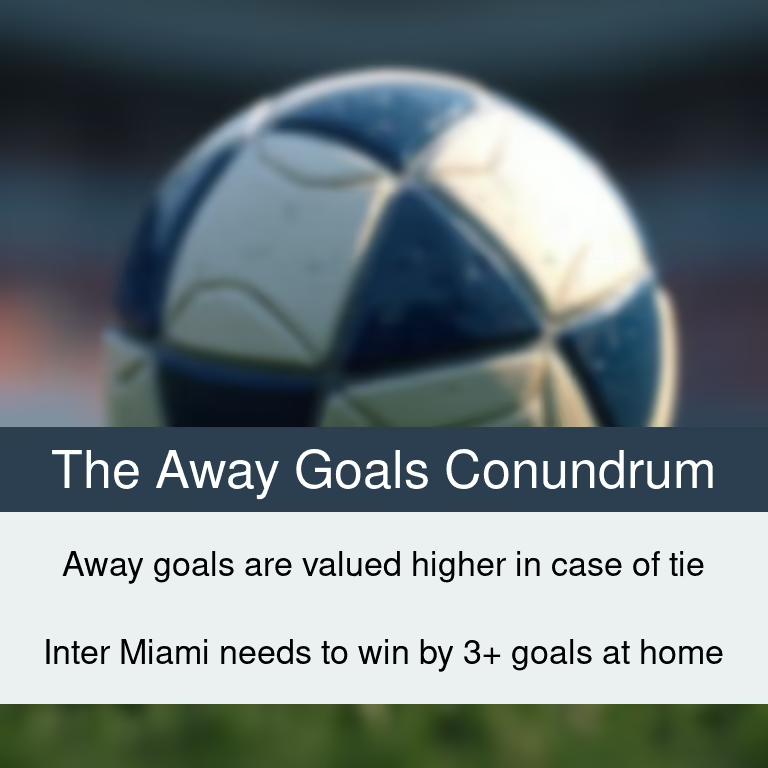In the high-stakes world of the Concacaf Champions Cup, a single rule looms large over Inter Miami’s hopes of reaching the final. After a disappointing 2-0 loss to Vancouver Whitecaps in the first leg of their semifinal tie, the away goals rule has emerged as a formidable obstacle for the MLS side.
Want to know what people are really saying? Don’t miss the buzz from Reddit at the end!
Vancouver Whitecaps Seize Advantage in Concacaf Champions Cup Semifinal
The Concacaf Champions Cup semifinal clash between Vancouver Whitecaps and Inter Miami has taken an unexpected turn. In the first leg, played at BC Place, the Whitecaps secured a commanding 2-0 victory over the star-studded Miami side, putting them in the driver’s seat for the return leg. This result has significant implications due to the away goals rule, a unique tiebreaker employed in Concacaf competitions.

Away Goals Rule Looms Large: What It Means for Inter Miami
The away goals rule is a tiebreaker system that gives greater weight to goals scored on the road. If the aggregate score is level after the two legs, the team that has scored more away goals advances to the next round. This rule has added an extra layer of complexity to Inter Miami’s task of overturning the 2-0 deficit. A single goal for Miami in the second leg would not be enough to level the tie, as Vancouver’s two away goals would still give them the advantage.

Overturning the Deficit: The Uphill Battle Facing Inter Miami
For Inter Miami to progress to the Concacaf Champions Cup final, they now face an uphill battle. A 2-0 victory in the second leg would only force extra time, as the away goals rule would still leave the tie level. To overturn the deficit outright, Inter Miami must win by a margin of at least three goals. This daunting task becomes even more challenging when considering the attacking prowess of Vancouver and the pressure of playing in front of a raucous home crowd.

Concacaf’s Unique Tiebreaker: Dissecting the Away Goals Rule
The away goals rule is a unique tiebreaker system employed in Concacaf competitions, including the Champions Cup. Its origins can be traced back to the 1960s, when it was introduced to encourage more attacking play from visiting teams. The rationale behind the rule is that scoring a goal away from home is considered a more challenging feat, and thus should be rewarded. While the rule has faced criticism from some quarters, it remains a defining feature of Concacaf tournaments, adding an extra layer of drama and intrigue.

Vancouver’s Commanding Lead: Breaking Down the Pivotal First Leg
Vancouver’s 2-0 victory in the first leg was a masterclass in defensive solidity and clinical finishing. The Whitecaps weathered early pressure from Inter Miami’s star-studded attack, before striking twice in the second half through well-worked goals from Ryan Gauld and Lucas Cavallini. This result not only gives Vancouver a valuable cushion but also puts them in a strong psychological position heading into the second leg, where they can afford to adopt a more conservative approach if needed.








Internet Reactions to Inter Miami’s Uphill Battle in the Concacaf Champions Cup Semifinal
The Concacaf Champions Cup semifinal clash between Vancouver Whitecaps and Inter Miami has sparked a lively discussion on Reddit, with fans weighing in on the significance of the away goals rule and the challenges facing the MLS side. As Vancouver secured a commanding 2-0 victory in the first leg, the consensus among commenters is that Inter Miami now faces an uphill battle to overturn the deficit and progress to the final.
Beyond the immediate implications of the first-leg result, the Reddit comments also touch on larger issues surrounding the MLS and its representation in international competitions. Some users express disappointment in the bias against MLS players by the US national team, while others call for a higher salary cap to improve the league’s competitiveness on the continental stage.